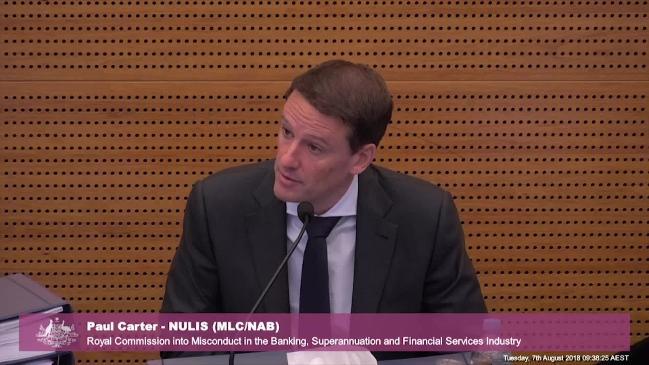Banking royal commission: NAB considered ways to keep charging service fee
NAB discussions about finding alternative justifications for a super fee were not limited to junior employees, inquiry hears.

An attempt by NAB to blame junior employees for attempting to keep charging super fund members a fee to which it was not entitled has collapsed in a heap this morning at the financial services royal commission.
Speaking from the bar table, counsel for the bank, Neil Young, QC, characterised efforts within the bank to find a way to keep charging a “plan service fee” to super fund members as something raised by people “at a low level”.
But the commission this morning heard that management of NAB’s super division mulled whether there were services it provided that could be used to justify continuing to charge the fee as they prepared for a meeting with chief customer officer Andrew Haggar in September 2016.
NAB eventually decided to refund the fee to more than 200,000 customers who did not have a financial adviser and compensate them for interest and lost investment opportunities at a cost of about $35m, the commission has heard.
The fee issue, which affected members of NAB’s MasterKey corporate funds, raged within NAB as it worked on cleaning up its super trustee structure in mid to late 2016.
Former NAB super boss Paul Carter, who is continuing to give evidence today after spending four hours in the witness stand yesterday, initially adopted Mr Young’s statement.
“The issues with the PSF were considered at multiple levels of the organisation and the email that you put to me was absolutely consistent with what Mr Young just said … that was relatively junior people that put that to me,” Mr Carter said.
However, he said it was something he did turn his mind to.
Counsel assisting the commission, Michael Hodge, QC, showed the commission an email Mr Carter wrote on September 19, 2016, in preparation for a meeting with Mr Haggar.
“Current thinking of eligible services are additional general advice services such as on-site visits” and invitations to “member town halls and education seminars”, Mr Carter wrote in the email.
Follow developments at the banking royal commission via our live blog
Mr Hodge put it to Mr Carter that this was consistent with the attitude of his team over the previous four and a half months it had been considering the problem, which was to attempt to find a service provided to members by NAB subsidiary MLC that could justify continuing to charge the fee.
“I would say what we were doing was making sure there was a full understanding of the issue and contemplating all of the questions we might be asked … that is correct,” Mr Carter said.
Mr Hodge also showed the commission a briefing paper apparently written by Mr Carter as the bank was considering what to do about the fee earlier in 2016.
Mr Carter said he did not recall writing the paper.
“That’s clearly what it says,” he said. “I don’t recall the specifics of this paper but it’s got my name on it.”
An appendix to the paper set out a range of services that NAB subsidiary MLC could say it provided to members who did not have an adviser.
These included town hall-style seminars and online education modules.
Mr Hodge asked: “Do we agree that it is not simply lower level employees that were asking these questions?”
“Certainly I had to consider these questions as well,” Mr Carter said.
He denied Mr Hodge’s suggestion he was “pushing” the possibility NAB might keep the fee because of the services provided by MLC.
Mr Carter agreed that at some time during the three months between May and August, when the fee problem was under consideration within NAB, he went back and looked at a 2012 guide the bank issued to companies who set up the MasterKey corporate funds.
In this guide, the plan service fee was described as one of “a number of ways you can remunerate your plan adviser for the services they provide you and your employees”.
Mr Hodge asked if there was some ambiguity as to who was going to providing the service.
“At the time, it was certainly one of the questions that was being asked,” Mr Carter said.
“There were many, many people involved in this process.”
“When did you come to the conclusion that it was not possible to retain the money?” Mr Hodge asked.
“When we put a final management paper to the trustee we had settled on a position and recommended full remediation and repayment of the customers’ money,” Mr Carter said.






To join the conversation, please log in. Don't have an account? Register
Join the conversation, you are commenting as Logout